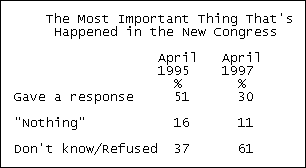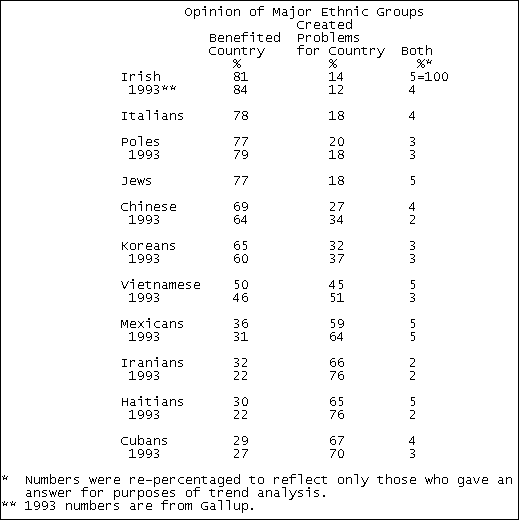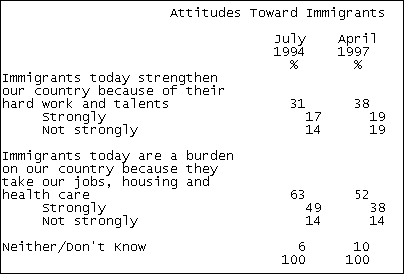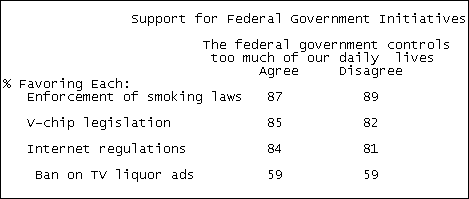Not Much Going On…
The public is unimpressed with the performance of the 105th Congress thus far. When asked to name the most important thing that has happened in the new Congress so far this year, fully 72% could not cite a single item. Those who responded gave a random assortment of legislative initiatives, led by welfare reform — a major accomplishment of the previous Congress. Also mentioned were the ongoing budget negotiations, vague impressions of bipartisanship and references to Newt Gingrich’s difficulties.

Job approval ratings for the GOP Congressional leaders are largely unchanged from earlier this year. Slightly more Americans disapprove than approve (44% to 40%). Most rank this Congress on a par with previous Congresses in terms of productivity. Only one- in-ten say this Congress has accomplished more than recent Congresses, 22% say it has accomplished less. College graduates are more likely than others to say this Congress has done less. Democrats, Independents and Republicans express this sentiment in equal proportions.
Whose Fault?
Among those who say this Congress has done less, a plurality (39%) blame Republican leaders. About half as many (19%) blame Clinton, 7% blame Democratic leaders in Congress, and the remainder (31%) give some combination of these. Republicans blame Clinton more than they blame their own party leaders (35% to 20%). Democrats overwhelmingly hold GOP leaders responsible (62% vs. 5% who say Clinton).
Republican Congressional leaders get mixed personal reviews from the public. Newt Gingrich’s favorability ratings remain low but have not changed significantly in recent months. Many more Americans view the Speaker unfavorably than favorably (64% to 28%). Senate Majority Leader Trent Lott, though not as well known as Gingrich, is viewed much more favorably. Among those able to rate him, 57% have a favorable opinion, 43% unfavorable.
Heaven’s Gate Top Story
The Heaven’s Gate suicide in San Diego was the most closely followed news story of the last month. Thirty-two percent followed it very closely, another 39% fairly closely. The suicide interested young and old Americans equally, though women were more interested in the tragedy than men.
One-in-five Americans (20%) have followed the trial of Oklahoma City bombing suspect Timothy McVeigh very closely, which is fewer than the 30% who followed very closely pre-trial publicity surrounding the O.J. Simpson criminal trial in September 1994. The legal settlement involving the Liggett tobacco company and 22 state attorneys general also attracted the attention of 20% of the public.
Ongoing revelations of improper fundraising by the Democrats are still not attracting the close attention of many Americans. However, more are now paying at least some attention to this story. Republicans continue to follow the story more closely than Democrats and Independents. Other attentive groups include affluent and better educated Americans and senior citizens.
News about the cloning of a sheep by a Scottish biologist and the ups and downs of the stock market were followed very closely by 17% of the public. College graduates paid more attention to these stories than other Americans. Young people largely tuned out news about the market and paid less attention the campaign finance scandal and the tobacco settlement.
Two major international stories, the Helsinki summit and the debate over NATO expansion, attracted very little attention from the public. Both were followed very closely by a mere 6%. Public interest in international summits has diminished dramatically in recent years, with the end of the Cold War marking the major turning point. Even as recently as 1994, however, the public paid much more attention to a meeting between Clinton and Russian President Boris Yeltsin. Forty- three percent followed news of a January 1994 summit meeting closely, compared to 26% who followed Helsinki this month.
Interest in the debate over NATO expansion remains low; only 6% of the public followed this debate very closely. The nation continues to divide evenly on whether NATO should be expanded to include some countries of Central and Eastern Europe, with 43% for expansion vs. 41% for the organization to remain unchanged. In a small experiment, respondents were somewhat more in favor of enlargement when the question identified the nations likely to be added (Poland, the Czech Republic and Hungary): 47% for, 39% against.
Public sentiment is also largely unchanged on its greatest concern regarding expansion: 39% fear not expanding will encourage Russia to again threaten its European neighbors (vs. 41% three months ago), while 29% fear a NATO expansion will anger the Russians (vs. 25% earlier).
Among those who followed the NATO debate closely, support for enlargement increased greatly: 61% favor expansion while only 28% were against change. However, this interested audience is very much like the general public in identifying its greatest concern about the enlargement: 43% fear not expanding will embolden Russia while 33% fear expansion will anger Moscow.
Opinions of Asians Unchanged
The involvement of Asian donors and the Chinese government in campaign-related scandals has not created a backlash against Asians in the United States. Of the newer groups of immigrants, Americans are most likely to view Asians as making a positive contribution to society. Fully 69% think the Chinese have generally benefited the country, compared to 64% who gave the same answer in July 1993. Sixty-five percent say the same about Koreans, and 50% about Vietnamese. In contrast, only about one third of Americans believe Mexicans, Iranians, Haitians and Cubans have benefited the country, with most respondents who answered the question saying that each of these groups has created problems. European immigrants — Irish, Italians, Poles and Jews — are all seen to have benefited the country significantly more than Asians or Latinos.

Asian immigrants get relatively high marks from the public for working hard, doing well in school, having strong family values, and being independent of government assistance, particularly when compared with immigrants from Latin American countries. To the extent that there has been a change in attitudes about Asians since 1993, it has been in a favorable direction. In the summer of 1993, for example, 79% of those who responded to the question said Asian immigrants work very hard, compared to 88% now.
Americans are significantly more likely to complain that Latino immigrants increase crime (52%, compared to 34% for Asian immigrants), and end up on welfare (68% vs. 34%). At the same time, however, majorities of Americans who gave an opinion said that immigrants from Latin America work hard (73%) and have strong family values. There is no clear pattern of change in feelings toward Latin American immigrants since 1993.

When asked to paint one word portraits of immigrants from Asian countries, the public responded most frequently with hard working or hard workers; other comments included okay, industrious, ambitious, intelligent, and . . . not needed. One word descriptions of Latinos most often mentioned were desperate and too many. Others were poor, illegal, hard working, and uneducated.
Opposition to Immigrants Softening
The poll also finds less opposition to immigration than observed in a comparable survey in mid-1994. At that time, when there was much coverage of California’s initiative to deny benefits to illegal immigrants, almost half of the public (49%) said they “strongly believed” immigrants are a burden on the country because they take American jobs, housing and health care, compared to 38% in this month’s survey. Nonetheless, today a majority of the public continues to believe that immigrants are more of a burden than a blessing. Those over 50 years of age more often than younger people say immigrants are a burden (57% vs. 48% under 30). Better educated, more affluent Americans more often express positive feelings toward immigrants, as do those living in big cities. Not surprisingly, those who were themselves born abroad said benefits from immigration outweigh its costs (60%).1 Those with a foreign-born parent or grandparent were only slightly more likely to say immigrants strengthen the country (41%) than were those without recent foreign ancestry (35%).

A large majority of Americans want immigration from all parts of the world to stay at current levels or even decrease. Forty- three percent would admit fewer newcomers from Asia, and another 44% would keep the number unchanged. Similar percentages want to decrease or stabilize immigration from Latin America (44% and 43%, respectively). The public is slightly less likely to favor any decrease in African and European immigrants, but there remains considerable support for cutting back here too (36% and 38%, respectively, favor reductions).
Highly Visible Newcomers
Almost four-in-ten Americans (39%) say that there are at least some recent immigrants living in their area, and 51% say that they often or sometimes have to deal with people who speak little or no English. Somewhat fewer (19%) number a recent immigrant among their friends or relatives. The majority of people who deal with immigrants with limited English skills say such encounters do not bother them (60%), but a large minority (39%) say they are bothered. People who generally see immigration as a burden are much more likely than those with positive views to be bothered by newcomers who have limited proficiency in English (57% vs. 19%).
But Americans who live in areas with many or some recent immigrants more often say that immigrants strengthen the country (42% and 45% respectively) than those who have no recent immigrants in their area (26%). This holds true even among native born Americans.
A Threat From Within
More than three out of four (77%) believe there is a chance that terrorists could use nuclear, biological or chemical weapons against an American city. In comparison, slightly more than half (57%) believe the same about a foreign country launching a nuclear strike on the United States. Fully 48% worry a great deal or somewhat about a terrorist attack with weapons of mass destruction, while only 29% worry a great deal or somewhat about a nuclear attack from a foreign country.
As the trial of Oklahoma City bombing suspect Timothy McVeigh gets underway, Americans increasingly believe that anti-terrorism laws on the books are inadequate to the threat. But they appear unwilling to give up some civil liberties to combat it. They view terrorism only slightly behind international crime and drug rings as the greatest threat to the country today (35% and 39%, respectively). And somewhat more of the public (47%) think that people inside the country pose a greater terrorism danger than those from abroad (40%). In post-Cold War America, foreign powers such as Russia and China are not perceived as major threats.
Last year, a Pew Center survey found that 56% of Americans said federal laws against terrorists are too weak.2 In the current survey, 63% answered the same way. But there was no significant change in the nearly two-thirds majority that thought it will not be necessary for the average person to give up some civil liberties to curb terrorism in this country. Similarly, the proportion of Americans now feeling the greatest terrorist threat comes from inside the country remained at just under half, much as last year.
“They” Should Do Something?
Americans are of at least two minds about the role of the federal government. In a general sense, a majority believe the federal government controls too much of their daily lives. Fully 69% of respondents agreed with this assertion, including 27% who completely agreed. At the same time, Americans express strong support for several specific federal government initiatives with the potential to significantly affect their daily lives.
Fully 87% favor stepped up enforcement of laws preventing children under 18 from buying cigarettes, for example. Nearly as many (84%) favor v-chip legislation requiring that new television sets be equipped with technology to block out certain programs based on their violent or sexual content. Eighty-three percent favor the federal law, recently challenged before the Supreme Court, making it illegal to send indecent or obscene material to children under 18 through the Internet. Nearly three-in-ten (28%) believe the government, i.e. inadequate laws or law enforcement, is responsible for the fact that more children these days are being exposed to printed or video materials depicting explicit sex or graphic violence. Fifty-nine percent blame inadequate parental supervision.
The public is less enthusiastic, though still supportive, of a proposed government ban on TV advertisements for distilled spirits, 59% approve of the proposal, 38% disapprove. Support for these initiatives is not dampened by general skepticism about the federal government. Those who believe the government controls too much of their daily lives are no less likely to favor enforcement of smoking laws, v-chip legislation, Internet regulations, or a ban on liquor advertising.





